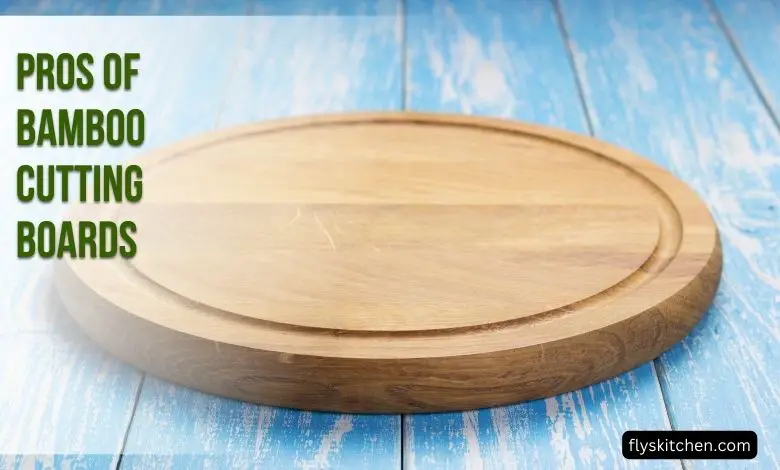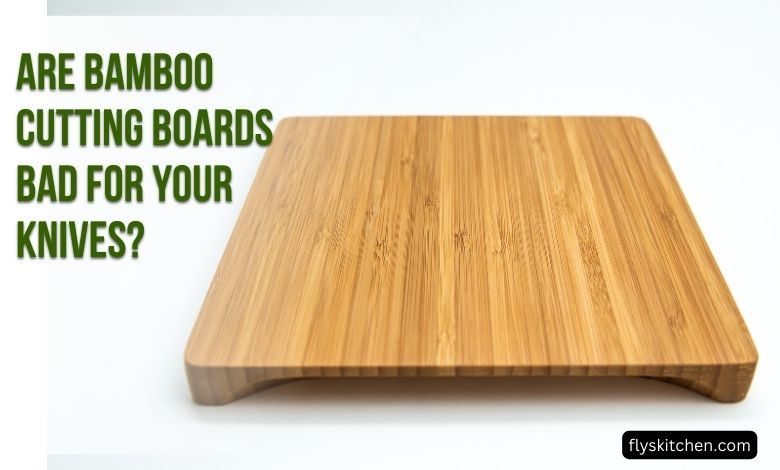Bamboo cutting boards have become increasingly popular in recent years as an eco-friendly and durable alternative to plastic and wood boards. But the jury is still out on whether bamboo is the best material for protecting your knives. In this article, we’ll examine the pros and cons of using bamboo cutting boards and help you decide if they are the right choice for your kitchen.
Contents
Introduction
Cutting boards are one of the most essential tools in any kitchen. A good cutting board will protect your countertops from knife marks and damage. It also protects your knives from unnecessary dulling. With options like plastic, wood, glass, and bamboo, it can be tricky to know which material is best.
In particular, many chefs and cooking enthusiasts have debated whether bamboo cutting boards are bad for knives. On the one hand, bamboo is praised for being lightweight, durable, and antimicrobial. However others argue that bamboo is too hard on knife edges compared to softer wood or plastic boards.
To find the answer, we’ll take a close look at the properties of bamboo cutting boards, how they affect knives, and how they compare to alternatives like wood and plastic. With the facts in hand, you can decide if bamboo cutting boards are right for your needs or if you’re better off choosing a different material.
The Pros of Bamboo Cutting Boards

First, let’s examine why bamboo cutting boards have become so popular in recent years:
- Bamboo is highly sustainable and renewable. It’s one of the fastest-growing plants on Earth, reaching maturity in just a few years. This makes bamboo an eco-friendly choice compared to slower-growing hardwoods.
- Bamboo cutting boards are naturally antimicrobial. The bamboo plant contains an antimicrobial compound called kun that helps reduce bacteria by up to 99.9%. This is useful for food safety.
- Bamboo boards are highly durable. The rigid structure of bamboo makes it resistant to scrapes, cuts, and wear over time. Quality bamboo boards can last for many years with proper care.
- Bamboo is lightweight and easy to maneuver. Bamboo cutting boards are typically lighter than wood or thick plastic boards of similar size. Their low density makes them easy to lift and move around.
- Bamboo is inexpensive. Since bamboo grows rapidly, bamboo boards are relatively cheap compared to end-grain wood boards that take decades to grow and harvest.
With all these advantages, it’s easy to see the appeal of stocking your kitchen with bamboo cutting boards. Before you run out and buy them, though, let’s look at the downsides.
The Cons of Bamboo for Knives
The biggest knock against bamboo cutting boards is their hardness:
- Bamboo is extremely hard and abrasive. On the Janka hardness scale, which measures the hardness of woods, bamboo rates 1,500 to 1,600 compared to just 200 to 300 for most kitchen-grade woods.
- This hardness can dull knives more quickly. Bamboo’s ultra-rigid structure causes more microscopic damage to knife edges as you chop and slice. This damage accumulates and requires more frequent sharpening.
- Lower-quality bamboo boards are more prone to damaging knives. Cheap bamboo boards often contain residual starches from the manufacturing process that can accelerate dulling. Higher-quality bamboo is treated to remove starches.
- Knives can indent and gouge bamboo over time. While bamboo itself is durable, knives can permanently dent and score bamboo boards after heavy use. These indentations harbor bacteria and need to be periodically sanded away.
- Bamboo is not as gentle on Japanese knives. Japanese knives rely on a delicate convex edge prone to chipping and microscopic damage from a material as hard as bamboo. European knives hold up slightly better.
While no definitive studies have proven bamboo dulls knives drastically faster than wood or plastic, there is strong anecdotal evidence from chefs and knife experts. Many advise against bamboo for fine cutlery and recommend softer woods like walnut or maple instead.
How does Bamboo compare to Other Cutting Board Materials?
To get a balanced perspective, let’s see how bamboo stacks up against the other two most popular cutting board materials – wood and plastic:
Wood
- Softer than bamboo, resulting in less dulling of knives over time. Look for woods like walnut, maple, hinoki, or larch generally rated under 300 on the Janka scale.
- Naturally antimicrobial like bamboo. Wood contains antibacterial compounds that reduce E. coli and Salmonella.
- Prone to splitting, warping, and water damage over time. Must be properly maintained with oil to prevent cracks.
- Gets scratched and cut over time from knives, leaving grooves that can harbor bacteria if not sanded away.
- Costs more than bamboo but less than end-grain boards. Around $50 for a decent-sized maple board.
Plastic
- Gentler on knives than bamboo. Softer plastic causes less microscopic damage to edges. Easy to cut grooves into the plastic though.
- Absorbs odors, stains, and bacteria more easily than wood or bamboo. Not naturally antimicrobial.
- More durable and resistant to water damage than wood. Doesn’t need special maintenance like oiling.
- Cheapest option. Basic plastic boards start under $10.
- Not sustainable or eco-friendly like bamboo. Made from polypropylene plastic.
As you can see, each material has tradeoffs. Bamboo is certainly harder than plastic and unfinished wood. But it also comes with antimicrobial properties lacking in the other two. No material will keep your knives factory-sharp forever – they all require honing and sharpening over time.
Tips for Using Bamboo Cutting Boards
If you do opt for bamboo boards, here are some tips to get the most life out of your knives:
- Stick with high-quality bamboo rated for kitchen use. Look for boards with a smooth finish free of residual starches.
- Use a bamboo board on one side, and a softer wood or plastic board on the other. Alternate materials to minimize wear.
- Avoid cutting bones, frozen foods, or other hard materials on bamboo. Use a designated plastic board for these tasks.
- Hand wash instead of dishwashing bamboo boards. The high heat and detergent of dishwashers can damage bamboo.
- Oil your bamboo board regularly with food-grade mineral oil to keep it from splitting or cracking. Let the oil fully absorb.
- Sand out any deep knife marks or grooves that develop over time. Deep cuts harbor bacteria.
- Sharpen your knives regularly to offset dulling from any cutting board material. An annual professional sharpening is advised for fine knives.
No board will ruin your knives after just a few uses. But taking these precautions will maximize the lifespan of both your knives and bamboo boards.
FAQs
Here are answers to some frequently asked questions about using bamboo cutting boards:
Are bamboo cutting boards antimicrobial?
Yes, bamboo contains an antimicrobial compound called kun that reduces bacteria on the surface by up to 99.9%. This makes bamboo more sanitary than plastic boards.
Should you oil bamboo cutting boards?
Yes, occasionally applying food-grade mineral oil helps prevent bamboo boards from drying out, splitting, or cracking. Let the oil fully absorb then wipe away any excess.
Can you put bamboo cutting boards in the dishwasher?
No, the high heat and harsh detergents can damage bamboo boards. Always hand wash and dry bamboo thoroughly after each use.
How often should you sharpen knives used on bamboo boards?
An annual professional sharpening is recommended for knives used on bamboo boards. For fine Japanese knives, consider sharpening every 6 months.
Can bamboo cutting boards go in the oven?
No, the glues used in bamboo boards cannot withstand high oven temperatures. Use bamboo only as a cutting surface, not for baking or roasting.
The Verdict
So where does this leave us on the original question? Here’s the bottom line:
Yes, bamboo cutting boards are harder than plastic and wood boards, so they will cause more microscopic dulling of knife edges over time. However, they are not so abrasive as to destroy knife edges immediately or make them unsafe to use. With proper care and sharpening, quality bamboo boards can still be a good option for most home cooks.
Bamboo boards have their advantages too – namely strength, sustainability, and antimicrobial properties. If used properly and alternated with softer boards, bamboo can be a durable and eco-friendly material. Just keep your knives sharp and avoid cutting extremely hard items on bamboo.
Those with high-end Japanese knives would be wise to stick to softer wood boards like maple instead. Plastic boards are gentler as well, though they require more sanitizing. Hardcore cooks may want a few different boards to alternate between.
But for most home kitchens, bamboo boards can safely give you years of use, keeping your knives in working order while standing up to heavy-duty chopping. Follow the care tips outlined and you can confidently use bamboo cutting boards without doing irreparable damage to your knives

